2023 Career Diversity Workshop Fellows Announced
The Humanities Without Walls consortium selected its Fellows cohort for the 2023 Career Diversity Workshop.
Comprised of 25 PhD students in the humanities and humanistic social sciences, the Fellows represent 20 higher education institutions across the nation. The Fellows will engage in a series of workshop sessions, talks, informational interviews, and site visits, hosted on-campus by the College of Liberal Arts at the University of Minnesota Twin Cities. Please join HWW in congratulating these new fellows!
Alexyss McClellan-Ufugusuku (History; Designated Emphasis in Critical Race & Ethnic Studies), University of California Santa Cruz
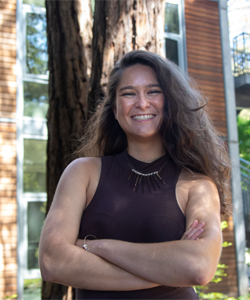
Alexyss (Lex) McClellan-Ufugusuku is a Shimanchu (Diasporic Ryukyuan) PhD candidate in the Department of History, with a designated emphasis in Critical Race & Ethnic Studies, at the University of California Santa Cruz. Her dissertation research looks at the long history of geo-political debate over the status of the Ryukyu Islands and at Ryukyuan self- representation at the United Nations, as well as modern forms of Indigenous Shimanchu identity-making in the diaspora. Lex is currently the graduate student leader for the Okinawa Memories Initiative’s (OMI) oral history team, and in the past has served on OMI’s curriculum development and policy teams. Currently, Lex is a graduate student instructor for a course on Okinawan history and memory, and this summer will teach her own class on the history of the Japanese Empire from 1869-1945.
Lex has given statements at the United Nations Permanent Forum on Indigenous Issues in New York, United Nations Expert Mechanism on the Rights of Indigenous Peoples in Geneva, and been in consultation with the UN Special Rapporteur on Toxics and Human Rights about numerous issues affecting the Ryukyu Islands and Ryukyuan people, and sees these forums as a way to forge Indigenous solidarity between peoples around the globe. Lex has participated in funded seminars at the National Humanities Center and through the National Endowment for the Humanities; her work has been featured in The Avery Review, Public History Weekly, and Shimanchu nu Kwii. In her free time, Lex is the Head Coach for the UC Santa Cruz intercollegiate women’s lacrosse team (go slugs!), which at its peak was ranked #5 nationally in 2022, and is an assistant coach for the high boys’ lacrosse team at Pacific Collegiate School in Santa Cruz.
Amanda Faulkner (History), Columbia University
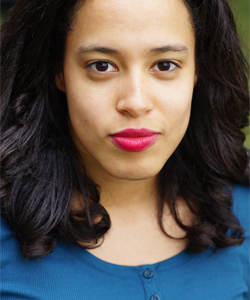
Amanda Faulkner is a Ph.D. candidate in history at Columbia University. Her dissertation investigates how people in two early modern cities – Amsterdam and New Amsterdam, which later became New York – came to understand themselves as belonging to (or being excluded from) the diverse social and cultural groups in each place. Drawing on notarial documents, legal records, letters, and personal papers, she explores how transatlantic migration – both voluntary and involuntary – shaped communities in Amsterdam and New Amsterdam between 1609 and 1715. In 2021-2022, Amanda researched on-site in the Netherlands as a Fulbright grantee. She also worked as a Mellon International Dissertation Research Fellow in Amsterdam and The Hague that same year. She is currently based in New York City as a Ford Foundation Predoctoral Fellow. Her work has also been supported by the American Society for Legal History.
Arif Hayat Nairang (Sociocultural Anthropology), University of Minnesota
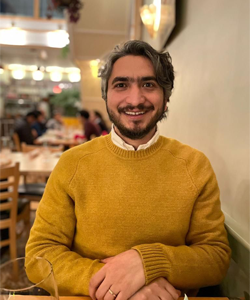
Arif is a PhD Candidate in Sociocultural Anthropology at the Department of Anthropology, University of Minnesota. His dissertation research explores how play and humor in everyday life give shape to a politics of survival in a situation of heterogeneous crises that includes political violence, land loss and environmental change in the villages of South Kashmir in the Kashmir valley in India. Currently, he is a Doctoral Dissertation Fellow with Charlotte W. Newcombe Foundation and is writing his dissertation.
Cecily Duffie (English), Howard University
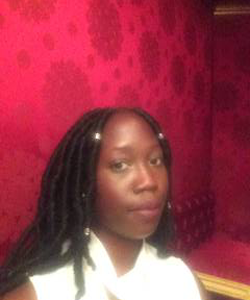
Cecily A. Duffie is a Ph.D student in English Literature at Howard University. She graduated Howard with a Master’s of Arts in English and has a B.A. from the University of Florida in African-American Studies. Her thesis is on Black Women Writers’ Postmodernism and explores the work of contemporary Black women writers such as Terry McMillan. She has been selected as an UC/HBCU scholar, NeMLA Panelist, and Howard University Research Week Panelist and Presenter. Her work has been published in The Miami Herald and Pedagogy and she has participated in the Wesleyan Writers’ Conference, the Bread Loaf Writers’ Conference, and Tin House Work Shop.
Elizabeth Barahona (History), Northwestern University
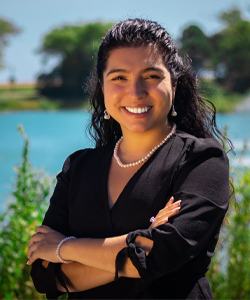
Elizabeth is a fifth-year doctoral candidate specializing in Latinx, African American, and United States history at Northwestern University. Her dissertation will chronicle how Black and Latinx communities created grassroots organizations and coalitions to fight white supremacy in the Deep South, specifically Durham, North Carolina. While in graduate school, Elizabeth co-founded a monthly wellness workshop for graduate women of color. She was the president of the History Graduate Student Organization, served on the executive board of the Latinx Graduate Student Association, and is a member of the Graduate Workers Union. Elizabeth graduated Phi Beta Kappa from Duke University studying borderlands, Latinx history, and human rights. Elizabeth led the protests to change Duke University’s policy to accept undocumented students, provide them full need-blind financial aid, create a Latinx center, and hire Latinx program staff.
Erica Fugger (American Studies), Rutgers University-Newark
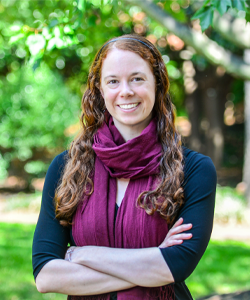
Erica Fugger is an oral historian and peace educator based at Rutgers University-Newark. Her doctoral research in American Studies explores the radical solidarities enacted by transnational peace movements during the Vietnam-American War. Erica previously managed Columbia University’s Center for Oral History Archives and Oral History MA program, and served as an Alliance for Historical Dialogue and Accountability Fellow at the Institute for the Study of Human Rights. She also directed Washington College’s World War II public memory program, the National Home Front Project, which collaborated with diverse communities across the United States to document and preserve civilian experiences of the war. Bridging her academic work with applied practice, Erica serves as a co-director of the Documenting Peace global research collaborative and a graduate assistant for the Community Organizing Oral History Project.
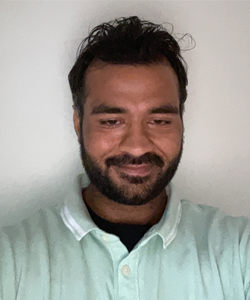
Harsha Anantharaman (Geography, Environment, & Society), University of Minnesota
Harsha Anantharaman a Ph. D candidate in the dept. of Geography, Environment & Society at the University of Minnesota. His research focuses on the political economy of waste in contemporary urban India, as well as the socio-cultural politics that underpin the on-going transformations to social and economic worlds grounded in the material discards produced in cities. Before joining the graduate program in 2017, Harsha worked as an activist-researcher in multiple organization that were active in this space.
Hassan Ali (Philosophy), University of Memphis

Hassan Ali is a second year PhD candidate in Philosophy at the University of Memphis. Her primary research interests lie in South Asian studies, decolonial philosophy, queer theory, and contemporary continental philosophy. Her dissertation focuses on colonial constructions of sex and their strategies of govermentality, and archival practices related to the transgender Hijra community in Pakistan. Hassan is also a recording music artist, and helps run Purgatory Pressings—a music label based in Memphis. In her spare time, Hassan also enjoys writing poetry, and has their work published in Borderlands, Phi Magazine, and the Aleph Review, among others.
Joana Chavez (Chicana/o and Central American Studies), University of California, Los Angeles
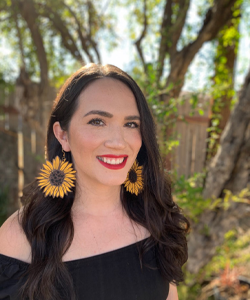
Joana Chavez is a first-generation student raised in the Inland Empire. She attended Mt. San Jacinto College and then transferred to University of California, Riverside where she got her BA in Ethnic Studies and Spanish in 2017. She is currently a PhD candidate in Chicana/o and Central American Studies at the University of California, Los Angeles. Joana is a graduate student researcher for the Archives division for Million Dollar Hoods Project-a community-driven and multidisciplinary initiative documenting the human and fiscal costs of mass incarceration in Los Angeles. She is also a recipient of the Ford Foundation Fellowship and the Cota Robles Fellowship. Her research analyzes gendered carceral spaces (youth group homes) and uses testimonios to uplift young women of color’s voices in these spaces.
Kathryn Whitlock (The School of Arts, Humanities, and Technology), University of Texas at Dallas
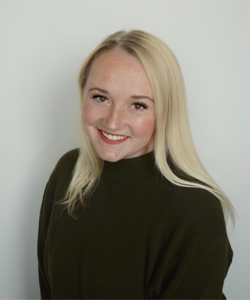
Kathryn Whitlock is a PhD student in Critical Media Studies within the School of Arts, Humanities, and Technology at The University of Texas at Dallas. Her research explores the spaces where the nonhuman animal meets feminist science and technology studies, media studies, surveillance studies, and feminist film studies. She earned her B.S. in entomology at Texas A&M University and her M.A. in Arts, Technology, and Emerging Communication at The University at Dallas. Drawing from her expertise in entomology—which centered on researching factors that contribute to monarch butterfly population decline—her research praxis endeavors interrogate the ways in which insects are researched, conserved, and utilized as a technology themselves in environmental maintenance practices rooted in colonial capitalism.
Kelly Sauskojus (Writing Studies), University of Tennessee, Knoxville
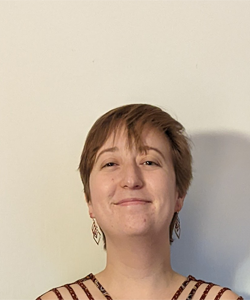
Kelly Sauskojus (she/they) is a PhD candidate in rhetoric, writing, and linguistics at the University of Tennessee, Knoxville. During the COVID times, she has spent a lot of time working at local urban agriculture and community garden nonprofits in Knoxville, serving on boards, growing and distributing produce, and helping win over $85,000 in grants. She is currently working on a dissertation about the process of how many different community members, staff, and volunteers who work at these nonprofits contributed toward three grants to support their work for land and food justice.
Liz Calhoun (Geography, Environment, & Society), University of Minnesota
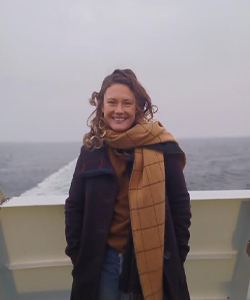
Liz Calhoun is currently a PhD candidate in the Geography Department at the University of Minnesota and a fellow at the Institute for Advanced Studies. She holds an MA in Critical Gender Studies from Central European University and a BA in History from UC Berkeley. Her academic interests are broadly within the interdisciplinary clusters of critical technology studies, critical race theory, and critical policing studies as well as the subfields of political and urban geography.
Her dissertation project examines the rise of ‘crime risk forecasting’ software used by municipal police departments in the US and asks how such technocratic reforms attempt to reshape the purview of policing (towards maintaining the status quo) in response to activist-led campaigns for defunding and police abolition. Political contestations around this software reveal the ways that divergent understandings of risk and contending visions for addressing harm index, mediate or transform the spatial scale of how political community is experienced and defined.
Lyd Epp Schmidt (American Studies), University of Kansas
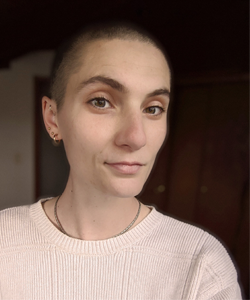
Lyd Epp Schmidt is currently a Ph.D. candidate in the American Studies department at the University of Kansas. Their master’s degree is in American Studies from the Universität Humboldt zu Berlin. They are currently the Assistant Editor of American Studies, a quarterly interdisciplinary journal published by the Mid-America American Studies Association. Their research takes dandelions and their human and more-than-human contexts as a case study to ask questions about bodies/bodily value, animacy, borders, the logics and grammars of nation, ecologies, dis/ability, weediness, and networks of care (among many more).
Marina Perez (Art History), University of New Mexico
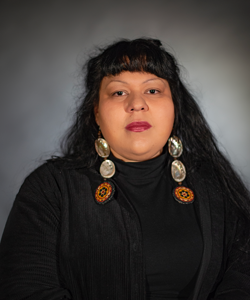
Marina Perez is a descendant of the Nahua and Huichol peoples of West Mexico. She is an interdisciplinary scholar, educator, and cultural worker specializing in community and cultural art-making practices. She earned an MA in American Indian Studies from the University of California, Los Angeles, and is currently a PhD student in Art History at the University of New Mexico. Her scholarship addresses emerging themes in contemporary Indigenous arts, archives, and oral histories.
Matilda Kukua Ansah (History), University of Wisconsin-Milwaukee
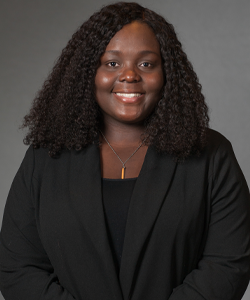
Matilda Kukua Ansah is currently a History doctoral student at the University of Wisconsin-Milwaukee. Her current research explores how West Africans immigration to the U.S. from the late twentieth century augments indigenous colonization. Her other areas of research interests are U.S. immigration history, empire studies, mobility in the British West African empire and African diasporic communities. She holds a M.A in African History at Northern Illinois University, Dekalb and a B.A in History from the University of Ghana-Legon. During her time at Northern Illinois University, she received recognition for her excellence in graduate teaching.
Matilda pursues her passion in advocacy for underrepresented groups by working as a project assistant for the University of Wisconsin-Milwaukee’s Ronald E. McNair Post-Baccalaureate Achievement Program, a federal education initiative that prepares first-generation, low-income, and minority undergraduate students for doctoral study through involvement in research and scholarly activities.
Monet Lewis-Timmons (English, African American Studies), University of Delaware
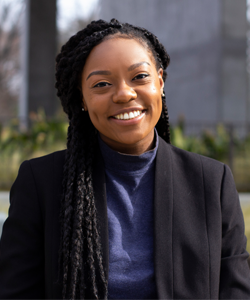
Monet Lewis-Timmons is currently an English PhD candidate and African American Public Humanities (AAPHI) Fellow at the University of Delaware. She received her B.A. in English and African American Studies from Emory University in Atlanta, GA. Her research focuses on the generational lineage of 19th century to the early 20th century Black women’s archives with a particular focus on the personal collection of educator and writer Alice Dunbar-Nelson. Through public humanities work, her research highlights the possibilities of Black women’s archives by prioritizing the intentional practice to preserve and redefine themselves through material objects. Her dissertation project will include an in-person exhibition at the University of Delaware showcasing the lifecycle of Dunbar-Nelson’s archive.
Morgan Graham (English), University of Minnesota
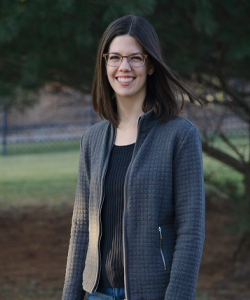
Morgan Graham is an English PhD candidate at the University of Minnesota. Her dissertation is about nineteenth-century novelist and poet Thomas Hardy and the contributions his wife, Florence, made to the biography he wrote about himself. Morgan’s research on auto/biography and women’s writing has been supported by the Women’s History Institute at Historic Hudson Valley and an Early Career PhD Merit Grant at the University of Minnesota. Morgan is managing editor of Pleiades: Literature in Context and assistant director of the Walter Nathan Literary Initiatives in the University of Minnesota Creative Writing program. She regularly contributes work to venues like Chicago Review of Books and has published award-winning scholarship in Shakespeare Bulletin and Perspectives on Undergraduate Research and Mentoring.
Nicolette Edwards (Anthropology), Southern Methodist University
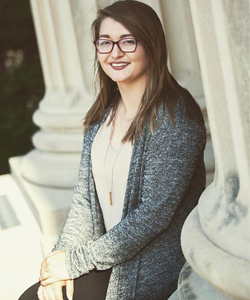
Nicolette is a PhD Candidate in Anthropology in the Dedman College of Humanities and Sciences at Southern Methodist University and was awarded the National Science Foundation Graduate Research Fellowship Program (NSFGRFP) in 2020. Her dissertation research is an ethnoarchaeology project that addresses the impact of women's roles on patterns of diet and nutritional stress among the Bofi and Aka forest foragers in the Central African Republic. She approaches her research through an interdisciplinary approach combining stable isotopic analysis and cortisol analysis of hair and ethnographic data.
Nicolette entered the PhD Anthropology program at Southern Methodist University in Fall of 2018, and her previous education experience includes receiving her BA of Anthropology from the University of Alaska Fairbanks in Spring 2017, and her MA of Anthropology from Southern Methodist University in Spring of 2020. She grew up in Alaska and has done archaeology both domestically and internationally, including in Alaska, Texas, New Mexico, Canada, and the Central African Republic.
Zinhle ka'Nobuhlaluse (Philosophy and Women, Gender & Sexuality Studies), The Pennsylvania State University
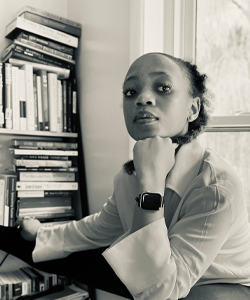
Zinhle ka’Nobuhlaluse is a dual-title PhD Candidate in Philosophy & Women, Gender and Sexuality Studies at Pennsylvania State University. They hold an MA in Philosophy from the University of the Witwatersrand (South Africa). Zinhle’s dissertation project, Towards an Existential-Phenomenological Standpoint (ESP) Reading of Blackwomen’s Autobiographies Under Apartheid South Africa, explores how the autobiographies of two South African Blackwomen, Mamphela Ramphele: A Life (1995) and Caesarina Kona Makhoere: No Child’s Play: In Prison Under Apartheid (1998), can be used to articulate a unique standpoint on the lived experience of being Black and woman under Apartheid South Africa, including its aftermaths.
In addition to being a Mandela Rhodes Scholar and an Allan Gray Orbis Fellow, they have a research affiliation with the DSI-NRF SARChI Chair in African Feminist Imagination at Nelson Mandela University in South Africa, are a dissertation fellow under the Africana Research Center at Penn State and serve as the moderator and convener of feminist dialogues and book talks for Penn State's African Feminist Initiative. Moreover, they are currently co-editing a special issue of Feminist Formations on ""Writing African Feminist Subjectivities”. Their scholarly work has appeared in journals such as Critical Philosophy of Race, South African Journal of Philosophy, Agenda, and Journal of World Philosophies. Zinhle is seeking a 300hr certification after already having a 200hr yoga teacher training certificate. They are also a marathon runner and a mixed-medium artist.
Pawan Sharma (Asian and Middle Eastern Studies), University of Minnesota

Pawan Sharma is a current Doctoral candidate at the Department of Asian and Middle Eastern Studies in the University of Minnesota working on visual media practices. He completed his Masters’ degree in Society and Culture (Film Studies) at Indian Institute of Technology, Gandhinagar, India. He is a researcher working on the space politics of popular South-Asian cinema. He is a passionate photographer and a filmmaker and has been into visual media production since the last 12 years; his films have been recognized by Directorate of film festivals and screened at International Film Festival of India 2016 and Berlinale Film Festival 2016. He has worked on multiple theoretical and hands-on documentaries and photo-series projects in collaboration with The New School, New York, the Shastri Indo-Canadian Fellowship at University of Alberta, Canada and DAS Art School, Amsterdam.
His fiction films and documentaries have been recognized by the Indian Ministry of Information and Broadcasting as well as have been screened at various international platforms. He has also been awarded with ‘India Explorer Fellowship’ from Indian Institute of Technology, Gandhinagar to work on a documentary exploring the relationship of individuals with the spaces around them. The ‘India ki Khoj’ fellowship provided him with the opportunity to explore and capture the essence of old cities structures and architecture of India and exhibited it at IIT Gandhinagar.
He has also been associated with the Sasan Gir National Forest, which is the only habitat of Asiatic lions in the world and has been working with the Indian Ministry of Forest Department and the African origin Siddi community residing in these Gujarat forests as the protectors of these lions. Currently, he is working on a photo-series representing the South-Asian and African migration and movement through material objects in the Minnesota urban spaces, for which he has been awarded Institute of Advanced Studies, Interdisciplinary Collaboration funding for 2020 and he is serving as a convener for an international visual media collaboration called ‘Memory, Movement, montage’ which will engage participants across three continents- Asia, Europe and North America.
His recent photo-series is exhibited by the Coffman Memorial Gallery at University of Minnesota, this particular series focuses on the interaction of different facets of migrants' life with the public spaces of New York City. The photo-series does not aim to focus on any one particular migrant group but rather tries to highlight the way the ""Ethnic Others"" have adapted and consumed the urban public spaces. Another mixed media visual arts exhibition created by him deals with the food cultures and identity formation among South Asian migrants has been part of various art galleries and museums.
Rolando Rubalcava (English, with emphasis on Medical Humanities), The Ohio State University
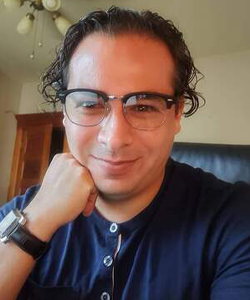
Rolando Rubalcava is a PhD Candidate in the Department of English, with an emphasis on Graphic Medicine, an intersectional discipline of Medical Humanities and Graphic Narratives. His most recent project includes a study on applying Narrative Medicine to address educational disparities for International Students. He comes from Southern California, completing his MA and BA at CSU Northridge, as well as his AA at Cerritos College. His teaching experience includes teaching as a Teaching Associate at CSU Northridge and adjunct faculty at Glendale Community College. Academic accomplishments include presenting his research at the Hayes Forum and becoming a Global Arts and Humanities Fellow.
In addition to his studies, Rolando Rubalcava is also the Editor of ¿Qué Pasa, Ohio State?, a student-run magazine lifting the voices of the Latinx student population at Ohio State, as well as a LASER (Latinx Space for Enrichment and Research) Mentor. If you'd like to learn more about his academic trajectory, check out his blog, Seeking Infinite Jest: My Road to the PhD.
Reuben Riggs-Bookman (Anthropology and History), University of Michigan
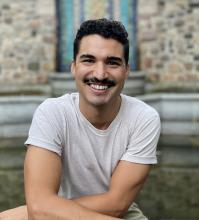
Reuben Riggs-Bookman is a PhD candidate in Anthropology and History at the University of Michigan, Ann Arbor. He has worked in and around cities as a racial justice community organizer, a university researcher, and a government community and economic development coordinator. His dissertation research focuses on issues of race, democracy, and post-industrial urban governance through the lens of metro Detroit suburbs taken over by the state of Michigan. His doctoral research has been supported by the Wenner-Gren Foundation for Anthropological Research, the University of Michigan Rackham Graduate School, and the National Center for Institutional Diversity. After completing his PhD, Reuben hopes to use the critical humanistic analysis he’s gained to contribute to on the ground efforts to make cities more livable for all.
Sabrina Fluegel (Hispanic Linguistics), University of Minnesota
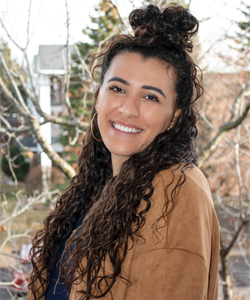
Sabrina is a PhD candidate and Graduate Instructor at the University of Minnesota in the Department of Spanish & Portuguese Studies. She studies Hispanic linguistics, with a focus on understanding the language used in media representing social and cultural issues. She also operates her own digital media production business, working as a social media manager for several advocacy projects including the BIPOC Foodways Alliance and Alce su voz. Sabrina's research publications and media productions share the common theme of challenging media representations to produce more diverse, equitable, and inclusive language representations of historically marginalized communities and to challenge mainstream U.S. relations through discourse.
Tyler Carson (Women's, Gender, and Sexuality Studies), Rutgers University-New Brunswick
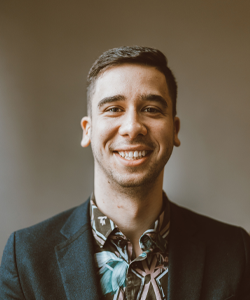
Tyler Carson is a PhD Candidate in the Department of Women’s, Gender, and Sexuality Studies at Rutgers University – New Brunswick. His dissertation, “The Kids are Not Okay!,” tracks the imbricated histories of child sex panics and modern gay rights in the United States from the late 1970s to the current day. His research seeks to demonstrate that the rhetorical force of child protectionism is part and parcel of a larger American cultural anxiety about the status of the white nuclear family. Tyler’s research has been generously supported by a four-year doctoral fellowship from the Social Sciences and Humanities Research Council of Canada. He holds a Bachelor’s and Master’s degree from the University of Toronto in Women and Gender Studies.
Yusi Liu (Classical and Near Eastern Archaeology), Bryn Mawr College
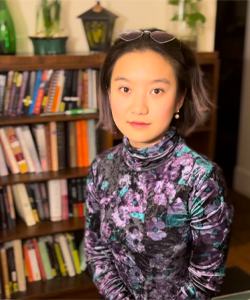
Yusi Liu grew up in Beijing, and she is a Ph.D. student in the Department of Classical and Near Eastern Archaeology at Bryn Mawr College (BMC). She holds an M.A. also from BMC and a B.A. with honors in Art History and Classics from the University of Wisconsin-Madison, where she was in the first cohort of the Humanities Exchange for Undergraduates and developed an interest in public humanities. With a research concentration in Greek archaeology, classical reception, and museum practice, Yusi is interested in pursuing a career in cultural institutions and organizations. She also works as the Program Manager at Global Bryn Mawr Office, where she supports committees and the College's travel health and safety work and fosters an understanding of how global learning happens at the College. She likes to practice zither in her free time and adores her tuxedo cat Birdie.